Media Guide, Part 3: Framing, Focus, Influence, CONTROL
Selecting What Information to Share, and How
Takeaway: the media constrains and manipulates dialogue by choosing who to platform, what to focus on, and how to discuss issues and phrase questions. While they are (usually) careful to avoid descending into outright slander or falsehood, they are nevertheless carefully avoiding facts and speakers which would counter their narrative. This ‘managed access’ is the single biggest factor distorting media coverage in our country, and its pervasive and obvious nature accounts for the wholesale abandonment of television channels and newspapers. People know that they’re being manipulated, and they don’t like it.
Media Guide, Part 1: the media divides the public and uses distraction and personal insinuation to create doubt and confusion about issues which MOST people would otherwise agree on: “this doesn’t happen”'; “this isn’t a big deal”; “people who care about this are bad people”; “the experts aren’t sure about this thing, and so you shouldn’t be either”; etc.
Media Guide, Part 2: legacy media is committed to simplified and moralistic narratives. Conflicting facts and different points of views must always be suppressed and simplified.
Media as Narrative-Constructing Machine
After 2024 it is no longer feasible to claim that the media isn’t primarily in the business of creating narratives.
The panic around Joe Biden’s debate performance (remember that? It feels like a half-decade ago) was only partly due to the electoral and wider political ramifications. It was just as much an anxious realization that the media had lied and had been caught in a lie.
If there was a standard distribution of opinions on offer, a forest of speculation and opinions and debate, then the ‘narrative’ narrative might have fallen flat. OF COURSE some people are going to get it wrong! Most of these hosts and writers and editors haven’t spent a lot of time with the President. They were dealing with incomplete information.
Instead, there was an almost-total consensus across legacy media: the President is fine and if you say otherwise you’re alarmist or ageist or a conspiracy theorist or… . We watched the gaslighting and denigration of dissenters and spinning of video clips and anecdotes in real time. Then it all fell apart.
Now, many of the people who enthusiastically maintained the lockstep omerta have pivoted and are pretending that they were tricked-or they’re simply choosing not to talk about the matter. That must seem strange to those of you who still have some faith in journalistic ethics. If a journalist is credibly accused of lying or suppressing facts or propagandizing, don’t you think they might want to answer the charge? Jake Tapper (a prominent participant in the cover-up) and Alex Thompson have written a book about the affair, called ‘Original Sin’. I haven’t read it-and I won’t-because I simply don’t trust anything Jake Tapper says at this point. I suspect many people agree with me.
Jake Tapper gaslights a guest concerning Biden’s fitness. Unless his book is a prolonged and self-flagellating apology it’s a disingenuous project. If it was, I doubt he’d still be on CNN.
Imagine what these numbers are like now… and notice the ‘independent’ trendline
Selective Focus, Uniformly Applied
But this is not an essay about the coverup of Biden’s dementia. That battle has already been won, and I know this because if you bring up the matter to former defenders of the media you’ll meet with uneasiness and a supreme effort toward changing the subject.
But there are dozens of other issues on offer, and many of them persist to this day. Some are frankly catastrophic. Urban crime, the black murder rate, public education metrics, the national debt, the (until recently) growing issue of lawfare, gender confusion and dysphoria among kids, mental health complaints among teens and adults, etc. On some issues we have seen a profound shift in the quality and scope of the media’s coverage, such as illegal migration and its effects. Sometimes that’s because of changing political realities; sometimes the facts of the situation just become too blindingly obvious to distort.
I haven’t watched this segment (above) but I can already guess at its theme: the issue of “migrant crime” is a bête noire on the right. Immigrants commit FEWER crimes (on average) than native-born Americans! Immigrants are basically decent people! That is all true, as far as I know. It doesn’t answer a lot of possible objections, which 5 minutes of reflection could grant. Such as:
‘Immigrants’ and illegal migrants are radically different groups of people
Couldn’t it be the case that there are many illegal immigrants who are especially dangerous which are now in our country? Shouldn’t this be a political issue?
Averages are a statistical abstraction. Even if illegal immigrants aren’t more disposed to robbing and killing people (which no one knows, honestly) couldn’t there be hundreds or thousands of communities whose per capita crime rate (not to mention their absolute crime rate!) has increased with the addition of migrants?
Isn’t the issue of border policy less about the character of the average migrant and more about national laws and policy?
Aren’t many groups of migrants radically different from one another? Why do we hear nothing about the particularities of different groups? This is not a uniform mass.
What effects will these newcomers have on the job market, especially at the low end? We’ve heard many soundbites about dearth of blueberry pickers… but I haven’t encountered ONE deep dive into the statistics or the specifics of the situation. Surely those are important to the debate.
Why are certain city and state government (still) not notifying ICE when they’ve arrested or convicted dangerous foreigners? What use is hiding the residency status of violent criminals? Who voted for that?
These (presumed) statements by John OIiver wouldn’t answer the issues of public resources, or facilities, or issues with identifying newcomers, or terrorist watch mechanisms, or public health, or…
I can almost guarantee that none of these issues were raised in the segment and that none of them have been raised in ANY segment or special or editorial or front-page story (perhaps a few in the managed-heterodox outlets like The Atlantic). These ideas are simply not acceptable to introduce to readers or viewers. Go ahead and try to find an exception, if you like. I’ll wait.
Emphasis, Influence, and Constraint
It’s not as if there’s a central committee organizing media narratives, but it’s close. Activists and thought leaders throw a lot of things out there (mostly on X, now). Some gather traction and these ‘memes’ filter down through the editorial staff of the major news producers. The television channels select people who will say what they want them to say (with 10-20% of dissenters thrown in to represent the 60% of viewers) and the journalists write the articles they’re tasked to write. The ‘off-limits’ possibilities (intelligence action against Trump, federal action against conservatives, corruption in political campaigns or parties or non-profits, mal-incentives when it comes to activism or non-profit activity for progressive causes, waste of federal money on progressive causes, academic corruption, anti-black implications of the left, anti-women implications of the left, anti-gay implications of the left, patriotism, elite disconnection, wealth and its ties to Democrats or anti-Trump sentiments, the failure of public schools, sexual abuses within public schools, corruption or waste in green energy proposals, the fragmentation of the family or communities, the increasingly difficult recruiting and work situation of police, crimes tied to migration policy, crimes tied to gender ideology, crimes tied to leftist ideas of any kind, etc.) are simply not stated. They’re not considered or debated or acknowledged.
Unfortunately, they now represent most of the political concerns and attitudes of the electorate. The tension has become undeniable… yet denial persists.
Of course, primetime news is now largely funded by pharmaceutical companies. Good luck trying to find some searching coverage about COVID vaccines or the lab leak hypothesis or ties between politicians and the industry or corruption within the industry. There is, to pout it lightly, a shortage of specials concerning these issues.
Anything that exposes corruption within the managerial state or makes the most important progressive causes look very bad or paints the left as hypocritical or out-of-touch is effectively untouchable. Journalism should strive for objectivity, so I don’t believe that emotional resonance should be generated to get views… but this reluctance simply doesn’t apply to Trump and his supporters. Any possibility of making them look unfriendly or criminal or out-of-touch is gladly explored.
One example of the kind of ‘forbidden narrative’ that you won’t see is the idea that the BLM protests of 2020 made things worse. Any hint that the ‘Ferguson effect’ might be valid, or that media coverage during this time made us a more racially hostile and dysfunctional country, or that progressive ideas which became popular among the elites are broadly unpopular or controversial (among black and white people), as subjects to teach to kids or enforce to a corporate workforce, are simply not countenanced. IF they arise (a true rarity) the panic is palpable.
These are the ideas and reforms that the managerial elite got behind most zealously. It’s probably too psychologically difficult (and politically costly) to countenance the possibility that their theories and buzzwords are widely despised and mocked, among black and white people. Try to find an exception to this trend. Try to find the story or special that points some of this out or notes the trends above. I’ll wait.
Silencing Dissent
Last month I drove up to Vero Beach and watched
give a presentation about the suspicious statistical correlations between different state voting laws and electoral results. The thing is, he was already featured in several major publications: The New York Times, Reuters, NPR.None of those outlets gave him a chance to explain his ideas frankly. The tone of these articles makes the assumption that his theories are misinformation. The latest New York Times special, which ran in the run-up to the last presidential election took a lightly mocking tone.
How awkward that he happened to predict the exact 2024 election results, down to the electoral college count? You run this experiment over and over again for a decade and you end up with a media environment like ours: fragmented, jaded, cynical.
I spoke to
after the event and he was very clear: they simply don’t print what they don’t want believed. Some marginal level of dissent or disagreement is acceptable (encouraged) but if you step outside the lines your platform gets taken away and your voice (in terms of access to the public via newspapers or cable news) is silenced. The New York Times would never run a story that reflected what believed, because those beliefs are anathema to the editors of that paper. So, now, are most of the things the public believes.Here’s another media idea that is never considered in their papers or on their shows: the public stopped watching you because they began to believe that you were engaged in a coordinated campaign of manipulation. Not MISINFORMATION, necessarily, but a rigid and perceptible framing and massaging and selective platforming, performed in order to validate and bolster your corporate interests and ideological prejudices.
How many stories have you read about ‘anti-LGBTQ’ parents’ groups and activists trying to ‘ban’ books and pressure schoolboards? Apparently, the issue is important enough to invite the attention of the FBI (another issue which has been untouchable by the media). Have you ever heard one of those parents or activists quoted or interviewed? No-they’re characterized in a certain way, as is their movement, and not given an opportunity to explain themselves. Have you ever seen any of the details of the most objectionable books? Neither have I… except in the farthest corners of the internet. This is a major issue, but one for which the precise details are curiously tricky to acquire.
How many stories did you read about racism in policing, and reform, and public safety? Have you ever seen or heard of an actual police officer interviewed for these pieces? Or is the narrative dominated by activists and academics and politicians? How curious that these are precisely the people who agree with the media line on this issue!
How many times did you watch a border patrol officer be interviewed about the migrant crisis?
These people have irreplaceable and crucial knowledge of these issues. They see things at the smallest granularity and often have vast experience. Their perspectives are invaluable. However, because of their experience and their realism their perspectives are often radically different from those of academics and journalists and politicians. The media isn’t a forum for exploring the issues and beliefs of American citizens. It’s a tool used by the managerial elite to sway and corral the public. It appears that this is all it can do. Now that people are less and less amenable to being swayed and corralled, the whole apparatus is dying a pathetic and unseemly (and accelerating) death.
I guess politicians and academics and pharmaceutical companies will have to find some other way to propagandize us.













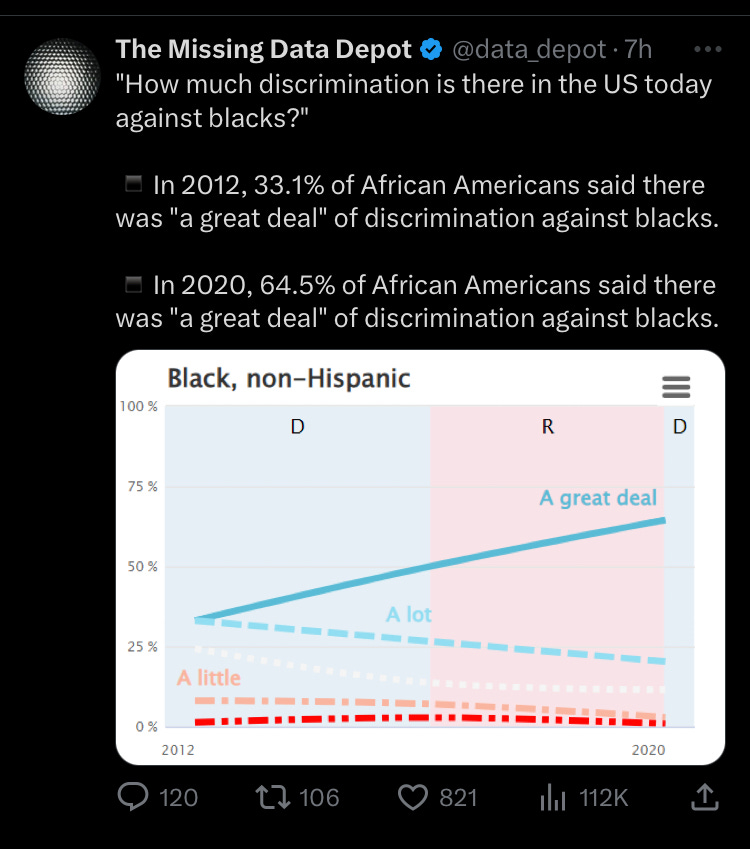
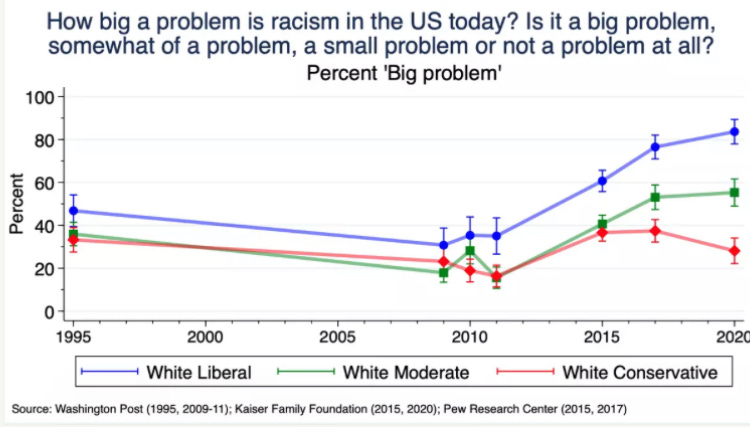


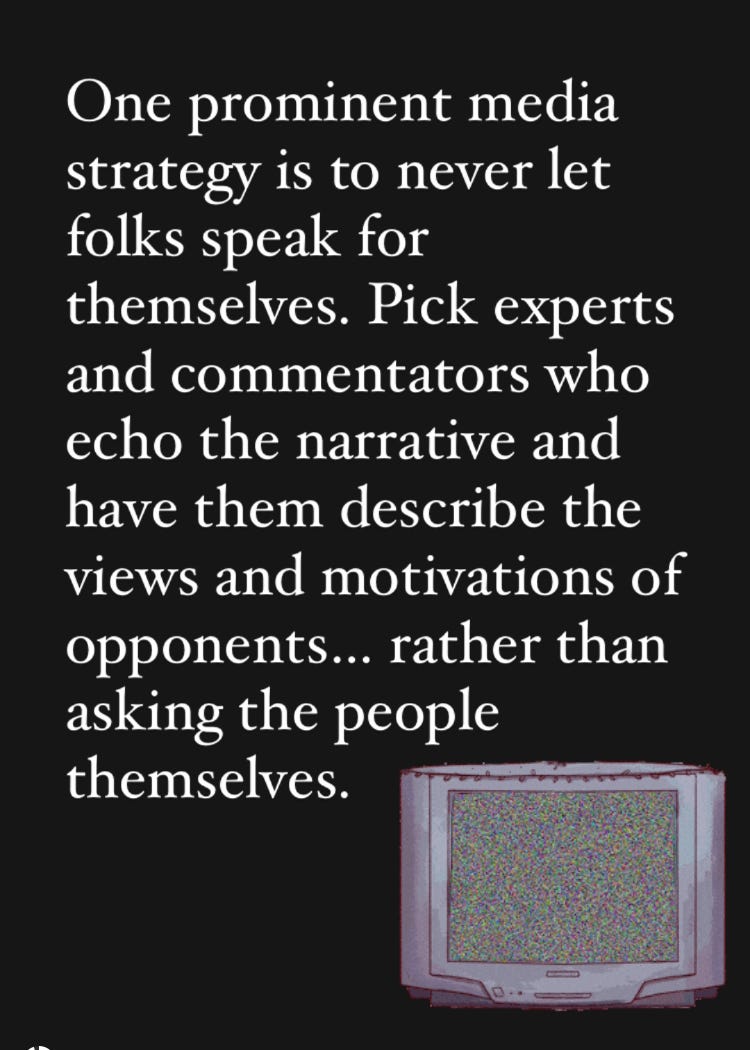


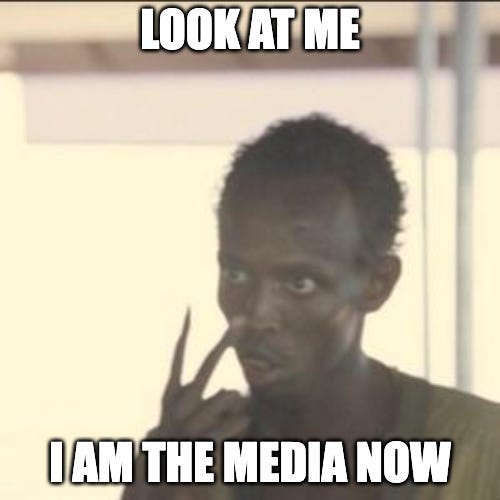

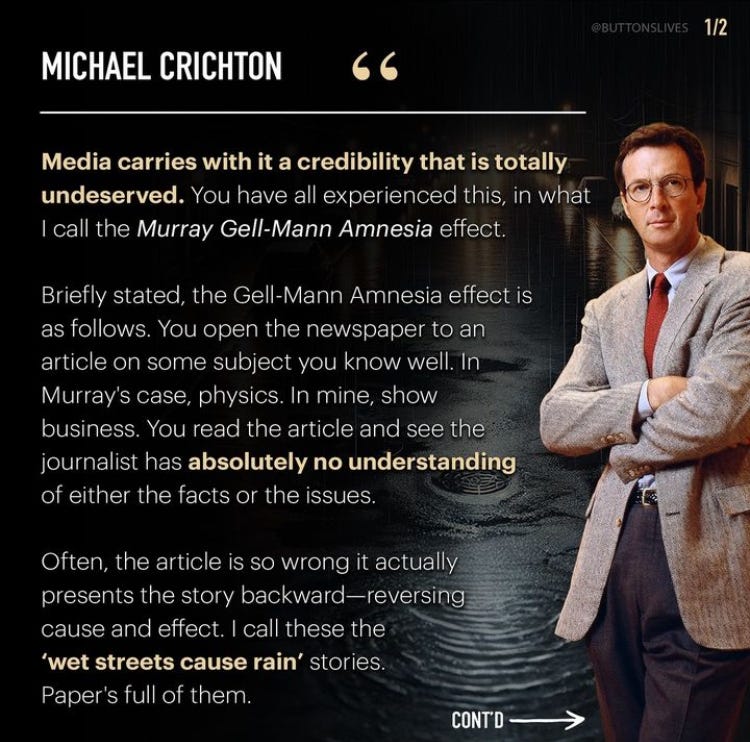

It’s still not clear to me exactly why the Biden administration decided that it was a good idea to open our borders to millions of unskilled, uneducated people. Allowing a relative small number of the well educated in each year is probability a good idea. This was one of the most disastrous policies the country has seen in my long lifetime. Importing millions of people who will work for next to nothing just to be here undermines the wages of our working class and exacerbates our national housing crisis when we can’t house our own citizens. It consumed billions of our tax dollars which could have been put to better use.
The age of mass migration is over. People cannot overpopulate their home country and just expect to move to greener pastures. There are no more green pastures. They need to voluntarily reduce their country's population to an environmentally sustainable level, stay there and work to improve their living conditions.
I still don’t understand those who say that we should not deport the majority of these interlopers. They violated our laws and continue to violate them and they should be removed not rewarded by allowing them to stay. There’s no statute of limitations on this illegal behavior. No one believes that they have a right to move to Paris and live their life there without the permission of the French and no one would argue that the French have no right to kick their sorry asses out of that country. Why do the same rules not apply to the United States? They clearly do.